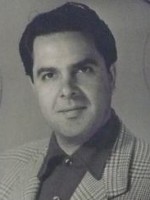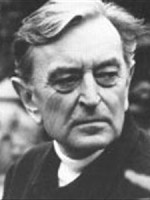Robert Rietti est un Acteur Italien né le 8 février 1923 à Ferrare (Italie)
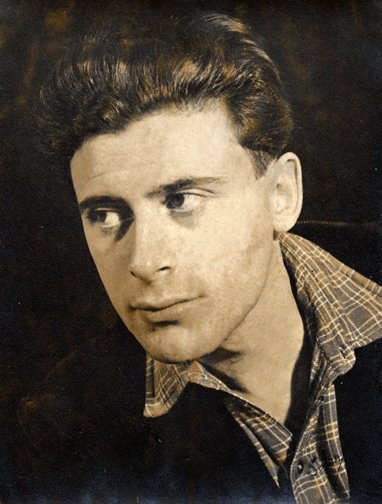
Robert Rietti, born Lucio Rietti and usually credited as Robert Rietty (8 February 1923 – 3 April 2015), was an English actor and director of Italian heritage. He was knighted by the Italian government.
He was 17 years old when Italy joined Germany in World War II and, being of Italian family, Rietty was placed in a detention camp with his father and brother Ronaldo (later a film director and producer). After eight months he was released upon special request to organise an army unit made up of professional actors to entertain the troops. It was during this time that his stage name was altered to Robert Rietty in an attempt to make it sound less Italian and more Irish (who were neutral during the war). It was under the name Robert Rietty that he would come to be known best by the public. He was chosen by John Gielgud to play Osric when Gielgud went to play Hamlet for troops Middle East and India. After 5½ years of army service Rietty returned to public attention, picking up where he had left off. Over the next several years he participated in every form of entertainment: radio, stage, films and the early days of television.
In radio Rietty teamed up with Orson Welles for The Third Man (1951) (a.k.a. Harry Lime), based on the hit film, and for the crime drama series The Black Museum (1952) broadcast to the United States armed forces. This proved to be the beginning of a lifelong friendship between the two and Orson used Rietty in many of his films. Rietty was also a regular on the radio series Horatio Hornblower (1952), Scarlet Pimpernel (1952) and Theatre Royal (1954), the last with Sir Laurence Olivier, as well as frequent guest appearances on other radio shows. In films Rietty continued to work mostly in character parts with the exception of his performances in Call of the Blood (1948), Prelude to Fame (1950) and Stock Car (1955). Also during this time he was heavily involved in the theatre starring in dozens of plays, even writing quite a few, and was editor of the drama quarterly Gambit.
Rietty once found the script of the Italian play To Live in Peace, which his father had translated to English, but had no luck convincing anyone to produce it. Despite the fact the story was rejected countless times, he rewrote the script and found a producer willing to back the project with his father in the lead role as Don Geronimo and himself as Maso. The play became an instant success, winning many awards, and toured in Europe, eventually being made twice as films made for television in 1951 and 1952. Rietty and his father were knighted by the Italian Government for their contribution to the Italian entertainment industry, in particular from translating Italian plays into English. Robert's knighthood was then upgraded. Early television took up much of Rietty's time, guest-starring repeatedly in over 100 TV shows, many of them being shot live. In television he often got the chance to work with his father again, most notably in The Jack Benny Program episode "Jack Falls into Canal in Venice" (1957) and in the pilot for the series Harry's Girls (1960). During the next 15 years most of Robert's acting was confined to TV and film with his most memorable performances in The Crooked Road (1965) with Robert Ryan and Stewart Granger, Hell Is Empty (1967) produced by his brother Ronald and co-starring French actress Martine Carol (who died before the end of shooting the film), The Italian Job (1969) and The Omen (1976) with Gregory Peck.
During this time Rietty made the change from actor to director (although he continued acting), becoming heavily involved in post-production work, directing and revoicing, and became sought-after director in Hollywood and Europe, known as the "King of Dubbers" and "Man of a Thousand Voices". His direction was used for almost every film in the James Bond series (and he acted in several) and hundreds of pictures.
Rietty has been an active actor for over 80 years. In 2009 he wrote an autobiography, A Forehead Pressed Against a Window, which was published in a limited edition with a foreword by Christopher Lee. His son, Jonathan, is an Orthodox rabbi who lives in the United States and lectures extensively for Gateways, a Jewish outreach organisation.
Source : Wikidata
Robert Rietti

- Infos
- Photos
- Meilleurs films
- Famille
- Personnages
- Récompenses
Nom de naissance Lucio Rietti
Nationalité Italie
Naissance 8 février 1923 à Ferrare (Italie)
Mort 3 avril 2015 (à 92 ans)
Nationalité Italie
Naissance 8 février 1923 à Ferrare (Italie)
Mort 3 avril 2015 (à 92 ans)
Biographie
Born of Italian heritage, Rietti was "discovered" at the age of 8 by his father Vittorio, veteran actor of the stage and screen, who noticed the boy had completely memorised a copy of a script he had given Lucio, having wanted help from his son while rehearsing his lines for a play. Vittorio had Lucio join his own acting school (which turned out students such as Ida Lupino). Hollywood mogul David O. Selznick, having seen the boy perform, tried to sign him to an extended contract with his studio but, being so young, strict schooling laws of the time forced him to decline the offer. He was handpicked by Alfred Hitchcock for the role of Stevie in Sabotage (1936), but again was forced to turn down the part. Eventually his father managed to work around these laws, and, under the name Bobby Rietti, made over 22 films before the age of 10. In the theatre he scored his first success starring as Poor Jo in Dickens' Bleak House sharing the billing with Gracie Fields, after which he starred as Jonathan opposite Elizebeth Bergner in The Boy David.He was 17 years old when Italy joined Germany in World War II and, being of Italian family, Rietty was placed in a detention camp with his father and brother Ronaldo (later a film director and producer). After eight months he was released upon special request to organise an army unit made up of professional actors to entertain the troops. It was during this time that his stage name was altered to Robert Rietty in an attempt to make it sound less Italian and more Irish (who were neutral during the war). It was under the name Robert Rietty that he would come to be known best by the public. He was chosen by John Gielgud to play Osric when Gielgud went to play Hamlet for troops Middle East and India. After 5½ years of army service Rietty returned to public attention, picking up where he had left off. Over the next several years he participated in every form of entertainment: radio, stage, films and the early days of television.
In radio Rietty teamed up with Orson Welles for The Third Man (1951) (a.k.a. Harry Lime), based on the hit film, and for the crime drama series The Black Museum (1952) broadcast to the United States armed forces. This proved to be the beginning of a lifelong friendship between the two and Orson used Rietty in many of his films. Rietty was also a regular on the radio series Horatio Hornblower (1952), Scarlet Pimpernel (1952) and Theatre Royal (1954), the last with Sir Laurence Olivier, as well as frequent guest appearances on other radio shows. In films Rietty continued to work mostly in character parts with the exception of his performances in Call of the Blood (1948), Prelude to Fame (1950) and Stock Car (1955). Also during this time he was heavily involved in the theatre starring in dozens of plays, even writing quite a few, and was editor of the drama quarterly Gambit.
Rietty once found the script of the Italian play To Live in Peace, which his father had translated to English, but had no luck convincing anyone to produce it. Despite the fact the story was rejected countless times, he rewrote the script and found a producer willing to back the project with his father in the lead role as Don Geronimo and himself as Maso. The play became an instant success, winning many awards, and toured in Europe, eventually being made twice as films made for television in 1951 and 1952. Rietty and his father were knighted by the Italian Government for their contribution to the Italian entertainment industry, in particular from translating Italian plays into English. Robert's knighthood was then upgraded. Early television took up much of Rietty's time, guest-starring repeatedly in over 100 TV shows, many of them being shot live. In television he often got the chance to work with his father again, most notably in The Jack Benny Program episode "Jack Falls into Canal in Venice" (1957) and in the pilot for the series Harry's Girls (1960). During the next 15 years most of Robert's acting was confined to TV and film with his most memorable performances in The Crooked Road (1965) with Robert Ryan and Stewart Granger, Hell Is Empty (1967) produced by his brother Ronald and co-starring French actress Martine Carol (who died before the end of shooting the film), The Italian Job (1969) and The Omen (1976) with Gregory Peck.
During this time Rietty made the change from actor to director (although he continued acting), becoming heavily involved in post-production work, directing and revoicing, and became sought-after director in Hollywood and Europe, known as the "King of Dubbers" and "Man of a Thousand Voices". His direction was used for almost every film in the James Bond series (and he acted in several) and hundreds of pictures.
Rietty has been an active actor for over 80 years. In 2009 he wrote an autobiography, A Forehead Pressed Against a Window, which was published in a limited edition with a foreword by Christopher Lee. His son, Jonathan, is an Orthodox rabbi who lives in the United States and lectures extensively for Gateways, a Jewish outreach organisation.
Le plus souvent avec
Filmographie de Robert Rietti (44 films)
Acteur

Hannibal (2001)
, 2h5Réalisé par Ridley Scott
Origine Royaume-uni
Genres Drame, Thriller, Action, Horreur, Policier
Thèmes Maladie, Psychologie, Tueur en série, Folie, Tiré d'une œuvre de Thomas Harris
Acteurs Anthony Hopkins, Julianne Moore, Gary Oldman, Ray Liotta, Frankie Faison, Giancarlo Giannini
Rôle Sogliato
Note67%





Après s'être échappé de sa captivité plutôt horrible, le docteur Hannibal Lecter vit désormais en Italie à Florence où il est devenu le conservateur d'une bibliothèque. Mais Mason Verger, une de ses anciennes victimes désireuse de se venger de lui, retrouve sa trace et commence à lui tendre un piège en utilisant Clarice Starling comme appât.
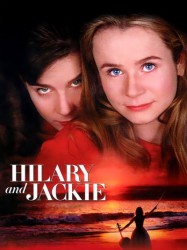
Hilary et Jackie (1999)
, 2h1Réalisé par Anand Tucker
Origine Royaume-uni
Genres Drame, Biographie, Musical
Thèmes La famille, La musique, Lié à la musique classique, Musique
Acteurs Emily Watson, Rachel Griffiths, James Frain, David Morrissey, Charles Dance, Celia Imrie
Note72%





Biographie de Hilary du Pré et de sa sœur, la violoncelliste Jacqueline du Pré.
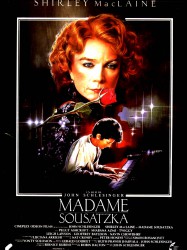
Madame Sousatzka (1988)
, 2h2Réalisé par John Schlesinger
Origine Royaume-uni
Genres Drame, Comédie dramatique, Musical
Acteurs Shirley MacLaine, Navin Chowdhry, Shabana Azmi, Peggy Ashcroft, Twiggy, Geoffrey Bayldon
Rôle Leo Milev
Note65%





Sushila et son fils Manek, des immigrés indiens, vivent chichement en Grande-Bretagne. Le jeune Manek a des dispositions pour le piano et sa mère confie son apprentissage à Madame Sousatzka, un professeur d’origine russe. Celle-ci pousse l’adolescent à exercer son art avec intransigeance en même temps qu’elle lui inculque ses propres valeurs morales, ce qui contrarie les attentes de Sushila…

Jamais plus jamais (1983)
, 2h14Réalisé par Irvin Kershner
Origine Royaume-uni
Genres Thriller, Action, Aventure, Espionnage
Thèmes Afrique post-coloniale, L'enfance, Espionnage, La mer, Le terrorisme, Transport, Action sous-marine, Arme nucléaire
Acteurs Sean Connery, Kim Basinger, Klaus Maria Brandauer, Barbara Carrera, Max von Sydow, Bernie Casey
Rôle un ministre italien
Note60%





James Bond a vieilli. Son supérieur le trouve en mauvaise forme et juge utile de lui faire suivre une cure dans une clinique privée. Dans cette clinique, Bond croise la route d'un certain Jack Petachi qui le conduit au SPECTRE, une organisation criminelle qui a dérobé deux ogives nucléaires à l'US Air Force. Bond essaie alors d'approcher sa sœur, Domino, qui est également la petite amie du commanditaire du vol, un certain Maximilian Largo. Bond et Domino s'allient alors contre Largo.

Rien que pour vos yeux (1981)
, 2h8Réalisé par John Glen
Origine Royaume-uni
Genres Thriller, Action, Aventure, Espionnage
Thèmes L'enfance, Espionnage, La mer, Sport, Le terrorisme, Transport, Action sous-marine, Politique
Acteurs Roger Moore, Julian Glover, Carole Bouquet, Chaim Topol, Lynn-Holly Johnson, Lois Maxwell
Note66%





Le Saint-George, bateau-espion britannique, sombre dans les eaux albanaises après avoir heurté une mine, engloutissant avec lui l'ATAC, système top secret de lancement de missiles. Les services secrets britanniques déclenchent une opération sous-marine discrète pour récupérer l'appareil.
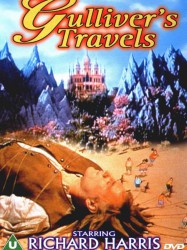 , 1h17
, 1h17Réalisé par Peter Hunt
Genres Science-fiction, Fantasy, Animation
Acteurs Richard Harris, Catherine Schell, Norman Shelley, Rod Taylor, Meredith Edwards, Michael Bates
Note54%





Malgré une brillante carrière de chirurgien qui l'attend, Gulliver décide d'écouter son cœur et quitte sa famille et l'Angleterre, pour sillonner les mers à la découverte d'autres cultures. Durant son voyage, son navire est emporté par une terrible tempête. Seul rescapé, il échoue sur la plage d'une île habitée par un petit peuple aux grandes ambitions...

La Malédiction (1976)
, 1h51Réalisé par Richard Donner
Origine Etats-Unis
Genres Thriller, Fantastique, Horreur, Policier
Thèmes L'enfance, Religion, Diable
Acteurs Gregory Peck, Lee Remick, David Warner, Billie Whitelaw, Patrick Troughton, Leo McKern
Rôle Monk
Note74%





Robert Thorn est ambassadeur des États-Unis à Londres. Plusieurs décès tragiques et étranges ont lieu dans son entourage. Keith Jennings, un photographe, et le père Brennan finissent par convaincre Thorn que Damien, son fils de cinq ans, un orphelin aux origines obscures qu'il a adopté le jour de sa naissance à l'insu de sa femme, celle-ci venant de mettre au monde un enfant qui est mort peu après sans aucune explication, n'est autre que l'Antéchrist.
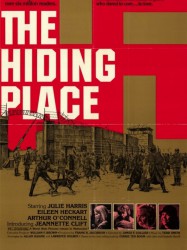
La valse des souvenirs (1975)
, 2h30Réalisé par James F. Collier
Origine Etats-Unis
Genres Drame, Guerre, Historique
Thèmes Religion, Politique, Religion juive
Acteurs Julie Harris, Eileen Heckart, Arthur O'Connell, David de Keyser, Nigel Hawthorne, Cyril Shaps
Rôle Willem ten Boom
Note73%





Découvrez la vie de Corrie ten Boom et de sa famille pendant la Seconde Guerre Mondiale, lors de l'occupation nazie en Hollande. Au péril de leur vie, cette famille est devenue un instrument de Dieu dans la résistance hollandaise, cachant des Juifs dans leur maison. Mais lorsque emprisonnés eux-mêmes dans des camps de concentration, ils n'ont plus que leur foi à quoi s'accrocher.
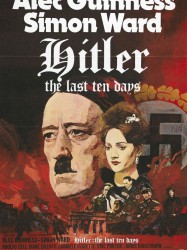 , 1h46
, 1h46Réalisé par Ennio De Concini
Origine Italie
Genres Drame, Science-fiction, Guerre, Thriller, Biographie, Historique
Thèmes Documentaire sur la guerre, Documentaire historique, Documentaire sur une personnalité, Hitler, Politique, Documentaire sur la Seconde Guerre mondiale
Acteurs Alec Guinness, Simon Ward, Adolfo Celi, Diane Cilento, Gabriele Ferzetti, Doris Kunstmann
Note64%





Le 20 avril 1945, Adolf Hitler fête ses 56 ans. Il suit le développement de la débâcle depuis son bunker, et finit par songer au suicide.
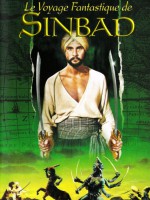 , 1h45
, 1h45Réalisé par Gordon Hessler
Origine Etats-Unis
Genres Drame, Science-fiction, Fantastique, Fantasy, Action, Aventure, Horreur
Thèmes Magie, La mer, Transport, Films pour enfants
Acteurs John Phillip Law, Tom Baker, Caroline Munro, Douglas Wilmer, Martin Shaw, Grégoire Aslan
Note67%





Sinbad et son équipage interceptent un homunculus transportant une tablette en or. Koura, créateur de l'homunculus et adepte de la magie, veut récupérer la tablette et se lance à la poursuite de Sinbad. Entretemps, Sinbad a fait la rencontre du Vizir qui détient une autre partie de la carte d'or modulable, et ensemble ils décident de mettre sur pied une expédition à travers les mers, en vue de résoudre l'énigme de la carte. Ils sont accompagnés d'une esclave qui a un œil tatoué sur la paume d'une main. Durant leur périple, il croisent des animaux étranges, des tempêtes, et leur route est parsemée d'embûches laissées par Koura.

Histoires d'outre-tombe (1972)
, 1h32Réalisé par Freddie Francis
Origine Royaume-uni
Genres Horreur
Thèmes Zombie, Comédie horrifique
Acteurs Ralph Richardson, Joan Collins, Peter Cushing, Roy Dotrice, Richard Greene, Ian Hendry
Note68%





Pendant une visite de catacombes, cinq touristes rencontrent le gardien de la crypte qui va leur raconter leur mort.
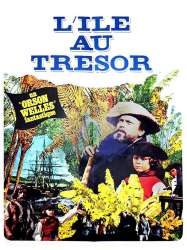
L'Île au trésor (1972)
, 1h34Réalisé par Antonio Margheriti, John Hough, Andrea Bianchi
Origine Royaume-uni
Genres Aventure
Thèmes La mer, Transport, Pirates, Le handicap, L'Or
Acteurs Orson Welles, Walter Slezak, Rik Battaglia, Lionel Stander, Ángel del Pozo, Michel Garland
Note57%





Dans un port de l'Angleterre, en 1765, Billy Bones, un vieux loup des mers, s'installe dans l'auberge des Hawkins. Jim le fils de la famille, devient son confident. Un jour, d'anciens compagnons d'armes du célèbre flibustier Flint débarquent et causent la mort de Billy Bones. Ce dernier a laissé un coffre où Jim découvre une carte indiquant l'emplacement du trésor de Flint...

Un dimanche comme les autres (1971)
, 1h50Réalisé par John Schlesinger
Origine Royaume-uni
Genres Drame, Aventure, Romance
Thèmes Sexualité, Bisexualité, Homosexualité, LGBT, LGBT
Acteurs Murray Head, Glenda Jackson, Nike Arrighi, Peter Finch, Peggy Ashcroft, Tony Britton
Rôle Daniel's Brother
Note69%





Bob Elkin, un sculpteur, est au coeur d'un triangle bisexuel amoureux entre Daniel, un médecin juif new yorkais et une jeune femme, Alex. Les deux amants se connaissent de vue mais préfèrent ne rien dire, par peur de perdre Bob.
 , 2h16
, 2h16Réalisé par Peter Hunt
Origine Royaume-uni
Genres Drame, Thriller, Action, Aventure, Espionnage, Romance
Thèmes L'enfance, Espionnage, Noël, Sport, Le terrorisme
Acteurs George Lazenby, Diana Rigg, Telly Savalas, Bernard Lee, Gabriele Ferzetti, Lois Maxwell
Rôle l'officiel du casino
Note66%





James Bond sauve la belle comtesse Tracy Di Vicenzo du suicide, mais est attaqué par des hommes de main. Il échappe de justesse à l’exécution. Bond s’intéresse de nouveau à la femme au casino, d’autant que Tracy perd une somme importante qu’elle ne peut payer. Pour remercier Bond de la dépanner, elle l'invite dans sa chambre, où quelqu'un tente à nouveau de l'attaquer. Après avoir éliminé l'intrus, Bond cherche Tracy et la trouve dans sa chambre, tenant un pistolet. Il la désarme et lui demande qui était l'homme qui s'était introduit dans sa chambre. Mais elle ne parvient à l'expliquer.
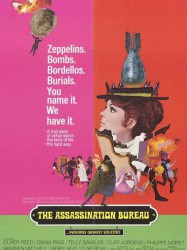
Assassinats en tous genres (1969)
, 1h50Réalisé par Basil Dearden
Origine Royaume-uni
Genres Thriller, Comédie, Action, Aventure, Policier
Thèmes Espionnage
Acteurs Oliver Reed, Diana Rigg, Telly Savalas, Curd Jürgens, Clive Revill, Vernon Dobtcheff
Rôle Police Officer with Eleanora
Note63%





Une journaliste débutante, persuadée de tenir un scoop, enquête sur une société mystérieuse appelée le bureau de l'assassinat.
 Connexion
Connexion


